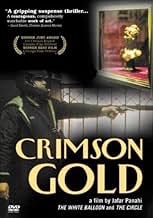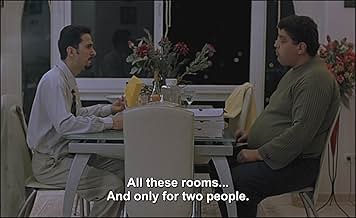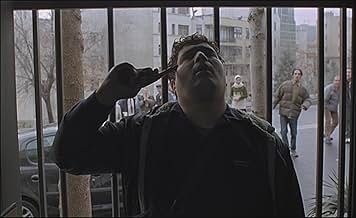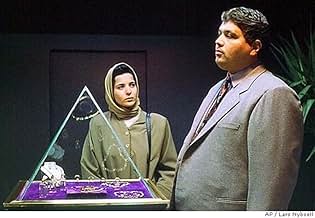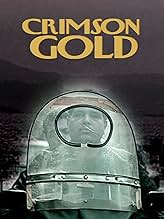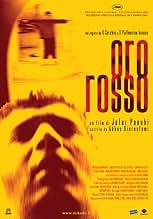IMDb रेटिंग
7.4/10
5.6 हज़ार
आपकी रेटिंग
अपनी भाषा में प्लॉट जोड़ेंAn Iranian pizza delivery man sees the worst of corruption and social unbalance in his city and is driven to crime.An Iranian pizza delivery man sees the worst of corruption and social unbalance in his city and is driven to crime.An Iranian pizza delivery man sees the worst of corruption and social unbalance in his city and is driven to crime.
- पुरस्कार
- 4 जीत और कुल 2 नामांकन
फ़ीचर्ड समीक्षाएं
8cwx
It's positively amazing what you can sometimes get with non-professional actors, basically playing themselves, especially compared to the many times that real actors flub things entirely. This film follows the sad trajectory of a disaffected pizza delivery driver in Tehran, but while his journey is rooted in reality and presented, aside from the cuts from one scene to another, in something much like real time including all the boring waiting periods (and without the comforting style of similar scenes in Chinatown), the story itself is almost fantastical, probably in part because the people Hussein meets are, to no small degree, more symbolic than anything. The story is heartbreaking and the visuals held my interest without being flashy in the least. Most interestingly, director Jafar Panahi provides us with a removed, rational view of modern Iranian society even as he shows his considerable skill in unobtrusively guiding us along with one man's unfortunate journey.
In September of 1980, as pretty much the first military operation of the Iran-Iraq war by ground forces, Iraqi forces captured the border post at Shalamcheh. Shalamcheh was later to be the site of the largest battle of the war, Operation Karbala-5. A passing reference to Crimson Gold's main character, Hussein, having been at Shalamcheh is made in the film. So what's quite easy to miss here, for a casual Western viewer, is that protagonist Hussein Emadeddin, sometime pizza deliveryman, is a war veteran. An Iranian viewer would be expecting this anyway; it was a huge war that engulfed the generation that Hussein belongs to. Not that many Iranians will see this movie, all Panahi's films are banned in his homeland. Shalamcheh is a resonant name to Iranians, and now contains a war memorial which many travel to. Part of the battle involved "human waves" which is to say lightly armed men, in large quantities charging the well-fortified Iraqi positions, basically suicide attacks. There are stories during the war of young men, apparently volunteers, charging the minefields, in order to clear them for the more experienced soldiers.
The Iran Iraq war was a particularly unpleasant throwback: commentators have compared it to World War One due to the predomination of trench warfare. In both wars for example there was the use of mustard gas, machine gun nests, shelling, and barbed wire. I think it's pretty much implied that Hussein has been a victim of the war. He's been taking cortisone on a long term basis. Due to the copious side effects, you don't do that unless there's something severely amiss, he would have to have a severe long term illness. Prolonged use of cortisone can be prescribed to treat severe lung disorders, I would suggest that Hussein may well have been gassed (hundreds of thousands of Iranian soldiers were gassed by sulphur mustard during the war, plus mustard was used at Shalamcheh during Operation Karbala-5, on civilian populations as well as Iranian troops).
The side effects of long term cortisone use include insomnia irritability, depression, swelling, obesity, diabetes, and depressed immune response. At one point Hussein has to climb four stories to deliver a pizza when a lift is out of order and the tenant won't come down; in the light of his condition, this appears rather more tragic. The character is very easy to sympathise with because, Hussein Emadeddin is played by Hussein Emadeddin, also a pizza deliveryman with severe health problems. There's a lot of realism here.
When thinking of post-war art in film, the term noir floats to the surface. Noir developed as an art form, if not necessarily an aesthetic, as a response to the zeitgeist of the Second World War's aftermath. An anonymous individual from the University Of San Diego has put it better than I can: "The historical setting is the contemporary world that has been corrupted and lost its moral certainty. The prevailing cynicism of characters reflects the reality of the atomic bomb, Cold War, totalitarianism, propaganda, Hollywood blacklist, corrupting power of the government and press. World War II fragmented men, caused them to feel adrift, insecure, alienated, a feeling of having "gone soft" and lacking power to control their lives. The liberal movement was in crisis, due to powerful forces of communism and materialism, causing a loss of faith in progress and man's innate goodness."
Since the war there's been a crisis for the liberal cause in Iranian society, which is referenced at one point by Hussein's friend Ali, who asks what it was like in (pre-theocratical) times when women walked around naked (without veils). It's clear that there's not much fun in the Iran of this world, in one scene Hussein asks a fifteen-year-old policeman if he's ever had fun, the young chap isn't even sure what the word means, and I think that makes two of them.
Despite Hussein having been pretty much left on the scrapheap, rotting in a dingy apartment to the tune of squeaking rats, he's a nice guy, and tries his best to be kind to folk. However, after a series of humiliations, he has had enough and commits a hideous folly. It's a film about injustice that manages to be, at the same time, warm-hearted, staggeringly beautiful and polemical. You can really take Hussein Emadeddin into your heart. Which is rare in a cinematic world where men are often armour plated and hard to love.
My respects for a profoundly humane film. Quite ironically it appears that Jafar Panahi was arrested within the last week whilst giving a dinner party at his home, an absurdity that you might think would make a good scene in a Panahi movie.
The Iran Iraq war was a particularly unpleasant throwback: commentators have compared it to World War One due to the predomination of trench warfare. In both wars for example there was the use of mustard gas, machine gun nests, shelling, and barbed wire. I think it's pretty much implied that Hussein has been a victim of the war. He's been taking cortisone on a long term basis. Due to the copious side effects, you don't do that unless there's something severely amiss, he would have to have a severe long term illness. Prolonged use of cortisone can be prescribed to treat severe lung disorders, I would suggest that Hussein may well have been gassed (hundreds of thousands of Iranian soldiers were gassed by sulphur mustard during the war, plus mustard was used at Shalamcheh during Operation Karbala-5, on civilian populations as well as Iranian troops).
The side effects of long term cortisone use include insomnia irritability, depression, swelling, obesity, diabetes, and depressed immune response. At one point Hussein has to climb four stories to deliver a pizza when a lift is out of order and the tenant won't come down; in the light of his condition, this appears rather more tragic. The character is very easy to sympathise with because, Hussein Emadeddin is played by Hussein Emadeddin, also a pizza deliveryman with severe health problems. There's a lot of realism here.
When thinking of post-war art in film, the term noir floats to the surface. Noir developed as an art form, if not necessarily an aesthetic, as a response to the zeitgeist of the Second World War's aftermath. An anonymous individual from the University Of San Diego has put it better than I can: "The historical setting is the contemporary world that has been corrupted and lost its moral certainty. The prevailing cynicism of characters reflects the reality of the atomic bomb, Cold War, totalitarianism, propaganda, Hollywood blacklist, corrupting power of the government and press. World War II fragmented men, caused them to feel adrift, insecure, alienated, a feeling of having "gone soft" and lacking power to control their lives. The liberal movement was in crisis, due to powerful forces of communism and materialism, causing a loss of faith in progress and man's innate goodness."
Since the war there's been a crisis for the liberal cause in Iranian society, which is referenced at one point by Hussein's friend Ali, who asks what it was like in (pre-theocratical) times when women walked around naked (without veils). It's clear that there's not much fun in the Iran of this world, in one scene Hussein asks a fifteen-year-old policeman if he's ever had fun, the young chap isn't even sure what the word means, and I think that makes two of them.
Despite Hussein having been pretty much left on the scrapheap, rotting in a dingy apartment to the tune of squeaking rats, he's a nice guy, and tries his best to be kind to folk. However, after a series of humiliations, he has had enough and commits a hideous folly. It's a film about injustice that manages to be, at the same time, warm-hearted, staggeringly beautiful and polemical. You can really take Hussein Emadeddin into your heart. Which is rare in a cinematic world where men are often armour plated and hard to love.
My respects for a profoundly humane film. Quite ironically it appears that Jafar Panahi was arrested within the last week whilst giving a dinner party at his home, an absurdity that you might think would make a good scene in a Panahi movie.
Jafar Panahi is one of the best directors of Iran,his works are upon the best movies of the world,showing the social problems of Iran,after wards Sohrab Shahid Sales is the best choice for watching movies,Crimson gold is the story of Hossein a soldier in Iran-Iraq war who got toxicated by chemical bombs is a mugger,and he delivers pizzas when doing his job he confronts completely different situations which his within is dazzled by them,he saw his friend which he wad a soldier too ,in a luxurious house,Hossein delivered pizza to his house and the price was 20.5 $,he paid him 21 bucks instead an d told him ,keep the tip,he saw the pain if society,he saw the pain within,every time he went to the jewellery's galleries he confronted with shocking prices, this movie is unrealizable for foreigners because they don't know the picture of our society and it's levels, first our society had three levels but the second level is vanishing and there will be only the level that lives in poverty ,and the level that is vomiting money, this movie is not the best movie,it's good but it has some boring scenes,but the direction,camera angles are good, this movie has somethings hided behind the scenes,you should know Iran to see this movie by the way i give it 7.2 out of 10
10Ivane
"He motorbikes every evening to neighborhoods he will never live in, for a closer look at what goes on behind closed doors. But one Night, Hussain tastes the luxurious life, before his deep feelings of humiliation push him over the edge."
It's sad to see reviews - saying this is a boring movie... This movie is so good, that I totally forgot about WATCH or even Time. Hussain is one of the most interesting characters I have ever seen... and with no doubt Jafar Panahi with his 'The Circle' and 'Crimson Gold' one of the most talented directors of our time...
thx for this movie... I really enjoyed watching it on Tbilisi International Film Festival (just today)and I hope the movie gets the main prize...
It's sad to see reviews - saying this is a boring movie... This movie is so good, that I totally forgot about WATCH or even Time. Hussain is one of the most interesting characters I have ever seen... and with no doubt Jafar Panahi with his 'The Circle' and 'Crimson Gold' one of the most talented directors of our time...
thx for this movie... I really enjoyed watching it on Tbilisi International Film Festival (just today)and I hope the movie gets the main prize...
Hussain was a metaphor for the people of Iran. The somnambulent, drugged out pizza deliveryman who was once thought of as heroic, now relegated to menial labor -- with only a small hint of what his life was like "before." The glimpses life in Teheran alone make this film intriguing and important viewing. This film was the source of much lively discussion at dinner afterwards. It was a revelation to most of us that not only were pizzas delivered in Teheran, but people could be arrested simply for attending parties in private apartments. It was also a revelation to most of us that luxurious jewelry stores operated in Iran, with Italian crafted jewelry, and the clientele to support them. Not to mention the luxurious, swimming pool equipped penthouse in the final scenes.
क्या आपको पता है
- ट्रिवियाThe lead actor, who plays a pizza delivery man, is actually a pizza delivery man in real life. He is also a paranoid schizophrenic, which may explain some of the character's traits and behavior.
- कनेक्शनFeatured in Cinema Iran (2005)
टॉप पसंद
रेटिंग देने के लिए साइन-इन करें और वैयक्तिकृत सुझावों के लिए वॉचलिस्ट करें
- How long is Crimson Gold?Alexa द्वारा संचालित
विवरण
- रिलीज़ की तारीख़
- कंट्री ऑफ़ ओरिजिन
- आधिकारिक साइटें
- भाषा
- इस रूप में भी जाना जाता है
- Crimson Gold
- फ़िल्माने की जगहें
- तेहरान, ईरान(location)
- उत्पादन कंपनी
- IMDbPro पर और कंपनी क्रेडिट देखें
बॉक्स ऑफ़िस
- US और कनाडा में सकल
- $1,48,959
- US और कनाडा में पहले सप्ताह में कुल कमाई
- $13,476
- 18 जन॰ 2004
- दुनिया भर में सकल
- $4,00,768
इस पेज में योगदान दें
किसी बदलाव का सुझाव दें या अनुपलब्ध कॉन्टेंट जोड़ें



